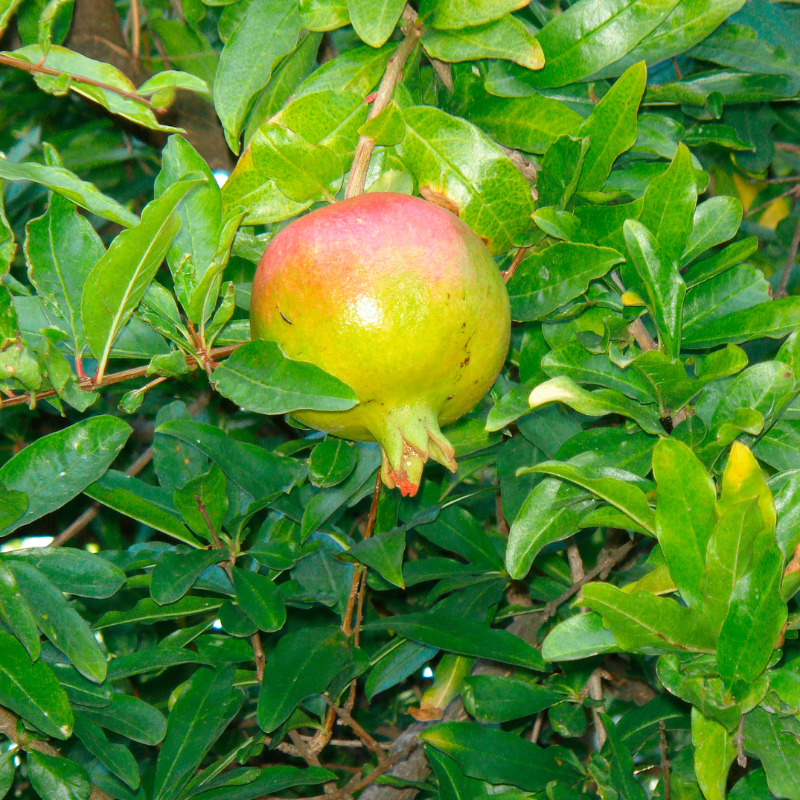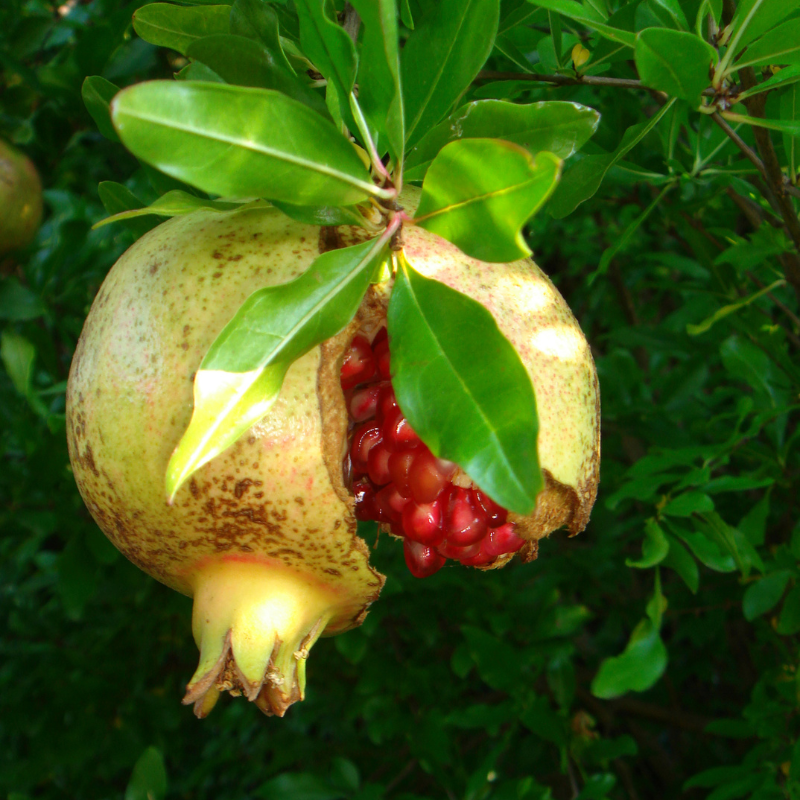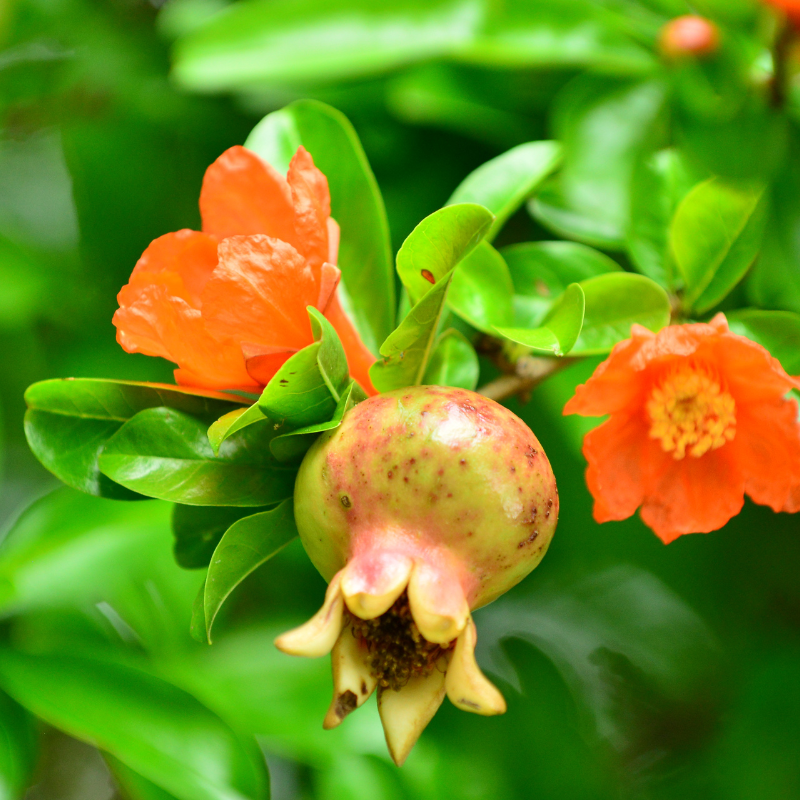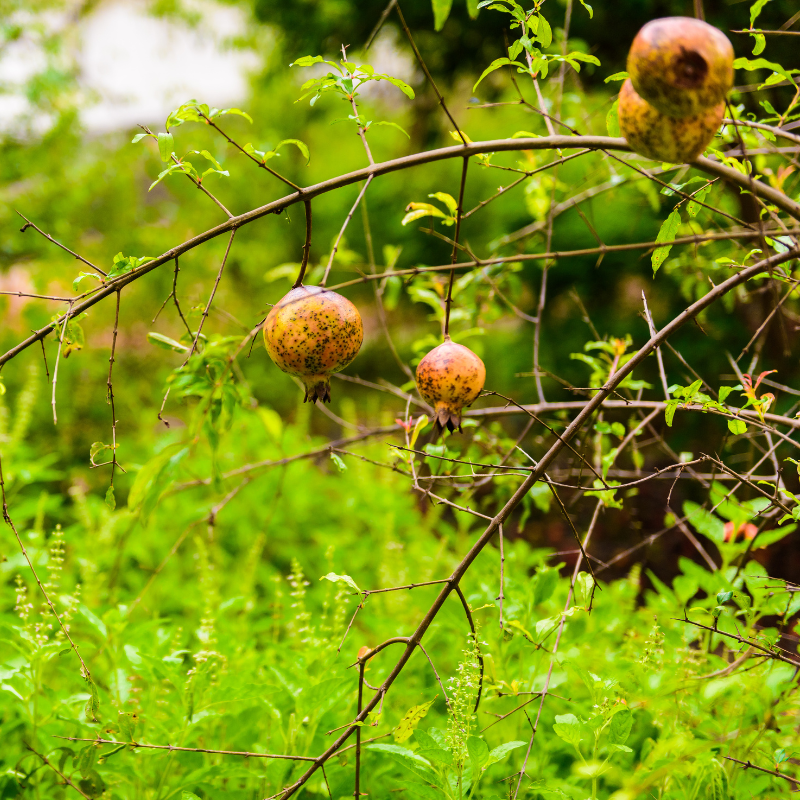Pomegranate Seeds (Punica granatum)
Pomegranate (Punica granatum), a celebrated fruit-bearing shrub or small tree, is both an agricultural treasure and a gardener’s delight. Native to regions spanning from Iran to Northern India, it is widely cultivated in subtropical and Mediterranean climates. Renowned for its jewel-like arils and rich flavor, the pomegranate has been cherished for centuries for its nutritional, medicinal, and cultural significance.
Plant Characteristics
Botanical Name: Punica granatum
Plant Type: Deciduous shrub or small tree, growing to a height of 3–8 meters. Can be pruned for size and shape, making it suitable for small gardens or containers.
Leaves: Glossy, lance-shaped leaves, growing in clusters.
Flowers: Bright orange-red, trumpet-shaped flowers that bloom prolifically, often a highlight in ornamental gardens.
Fruit: Round fruits with a thick, leathery rind in shades of red or yellowish-orange. Inside are tightly packed arils, each containing a juicy, flavorful seed.
Cultivation and Growing Guide
Climate Requirements
Ideal Zones: Thrives in tropical, subtropical, and Mediterranean climates. Prefers warm summers and mild winters. Hardy down to -12°C but performs best in temperatures between 20–35°C.
Light: Requires full sunlight for at least 6–8 hours daily to ensure optimal flowering and fruiting.
Soil Preferences
Type: Adaptable to a variety of soil types, including sandy, loamy, and clay soils, provided they are well-drained.
pH Level: Tolerates a pH range of 5.5 to 7.5. Neutral to slightly alkaline soils are optimal.
Drainage: Good drainage is critical; pomegranates are prone to root rot in waterlogged conditions.
Planting Instructions
Seed Preparation: Soak seeds in warm water for 24 hours to soften the outer coating and encourage germination. Lightly dry them before planting.
Sowing: Plant seeds 1–2 cm deep in pots or directly in the ground. Maintain spacing of at least 3–5 meters between plants if grown in rows.
Germination: Seeds germinate within 2–4 weeks under optimal conditions of 25–30°C. Ensure the soil remains consistently moist but not waterlogged during this period.
Watering and Fertilizing
Watering: Regular watering during the first year is crucial for root establishment. Once established, pomegranates are drought-tolerant but benefit from deep watering every 7–10 days during dry spells.
Fertilizing: Apply a balanced fertilizer (10-10-10) every 2–3 months during the growing season. Supplement with compost or well-rotted manure for better soil health and fruit quality.
Pruning and Maintenance
Pruning: Conduct light pruning annually to remove dead or damaged branches and encourage airflow. Shape the plant to maintain an open canopy, which helps prevent fungal issues.
Mulching: Use organic mulch around the base to retain moisture, suppress weeds, and regulate soil temperature.
Harvesting
Maturity: Fruits take 6–7 months to mature after flowering.
Signs of Ripeness: The fruit develops a deep, rich color. When tapped, ripe fruits produce a metallic sound.
Storage: Harvested fruits can be stored in a cool, dry place for up to 2 months.
Special Tips for Growing
Pollination: Pomegranates are self-pollinating but benefit from bees and wind for enhanced fruit set. Plant multiple trees to encourage cross-pollination if space allows.
Container Gardening: Ideal for urban spaces, pomegranates grow well in large pots (at least 60 cm in diameter). Ensure pots have proper drainage holes.
Pest Management: Watch for aphids, whiteflies, and mealybugs. Use neem oil or insecticidal soap as a natural remedy. Protect fruits from fruit borers with fine netting.
Cold Protection: In colder climates, consider planting in sheltered areas or using frost covers during winter.
Benefits of Pomegranates
Nutritional Value: Rich in antioxidants, vitamins C and K, and dietary fiber.
Culinary Uses: Perfect for fresh eating, juicing, salads, and even savory dishes.
Medicinal Uses: Revered in traditional medicine for improving heart health, digestion, and skin vitality.
Shipping Information
We deliver seeds across India and worldwide. Orders are typically processed within 1–2 weeks to ensure freshness and quality in every batch. For additional information regarding shipping, feel free to contact us.
Pomegranate is more than just a plant; it’s a legacy of health and beauty that thrives in your garden with the right care and attention. Start cultivating this ancient treasure today with premium seeds from Deodar Seeds Company.
Pomegranate (Punica granatum), a celebrated fruit-bearing shrub or small tree, is both an agricultural treasure and a gardener’s delight. Native to regions spanning from Iran to Northern India, it is widely cultivated in subtropical and Mediterranean climates. Renowned for its jewel-like arils and rich flavor, the pomegranate has been cherished for centuries for its nutritional, medicinal, and cultural significance.
Plant Characteristics
Botanical Name: Punica granatum
Plant Type: Deciduous shrub or small tree, growing to a height of 3–8 meters. Can be pruned for size and shape, making it suitable for small gardens or containers.
Leaves: Glossy, lance-shaped leaves, growing in clusters.
Flowers: Bright orange-red, trumpet-shaped flowers that bloom prolifically, often a highlight in ornamental gardens.
Fruit: Round fruits with a thick, leathery rind in shades of red or yellowish-orange. Inside are tightly packed arils, each containing a juicy, flavorful seed.
Cultivation and Growing Guide
Climate Requirements
Ideal Zones: Thrives in tropical, subtropical, and Mediterranean climates. Prefers warm summers and mild winters. Hardy down to -12°C but performs best in temperatures between 20–35°C.
Light: Requires full sunlight for at least 6–8 hours daily to ensure optimal flowering and fruiting.
Soil Preferences
Type: Adaptable to a variety of soil types, including sandy, loamy, and clay soils, provided they are well-drained.
pH Level: Tolerates a pH range of 5.5 to 7.5. Neutral to slightly alkaline soils are optimal.
Drainage: Good drainage is critical; pomegranates are prone to root rot in waterlogged conditions.
Planting Instructions
Seed Preparation: Soak seeds in warm water for 24 hours to soften the outer coating and encourage germination. Lightly dry them before planting.
Sowing: Plant seeds 1–2 cm deep in pots or directly in the ground. Maintain spacing of at least 3–5 meters between plants if grown in rows.
Germination: Seeds germinate within 2–4 weeks under optimal conditions of 25–30°C. Ensure the soil remains consistently moist but not waterlogged during this period.
Watering and Fertilizing
Watering: Regular watering during the first year is crucial for root establishment. Once established, pomegranates are drought-tolerant but benefit from deep watering every 7–10 days during dry spells.
Fertilizing: Apply a balanced fertilizer (10-10-10) every 2–3 months during the growing season. Supplement with compost or well-rotted manure for better soil health and fruit quality.
Pruning and Maintenance
Pruning: Conduct light pruning annually to remove dead or damaged branches and encourage airflow. Shape the plant to maintain an open canopy, which helps prevent fungal issues.
Mulching: Use organic mulch around the base to retain moisture, suppress weeds, and regulate soil temperature.
Harvesting
Maturity: Fruits take 6–7 months to mature after flowering.
Signs of Ripeness: The fruit develops a deep, rich color. When tapped, ripe fruits produce a metallic sound.
Storage: Harvested fruits can be stored in a cool, dry place for up to 2 months.
Special Tips for Growing
Pollination: Pomegranates are self-pollinating but benefit from bees and wind for enhanced fruit set. Plant multiple trees to encourage cross-pollination if space allows.
Container Gardening: Ideal for urban spaces, pomegranates grow well in large pots (at least 60 cm in diameter). Ensure pots have proper drainage holes.
Pest Management: Watch for aphids, whiteflies, and mealybugs. Use neem oil or insecticidal soap as a natural remedy. Protect fruits from fruit borers with fine netting.
Cold Protection: In colder climates, consider planting in sheltered areas or using frost covers during winter.
Benefits of Pomegranates
Nutritional Value: Rich in antioxidants, vitamins C and K, and dietary fiber.
Culinary Uses: Perfect for fresh eating, juicing, salads, and even savory dishes.
Medicinal Uses: Revered in traditional medicine for improving heart health, digestion, and skin vitality.
Shipping Information
We deliver seeds across India and worldwide. Orders are typically processed within 1–2 weeks to ensure freshness and quality in every batch. For additional information regarding shipping, feel free to contact us.
Pomegranate is more than just a plant; it’s a legacy of health and beauty that thrives in your garden with the right care and attention. Start cultivating this ancient treasure today with premium seeds from Deodar Seeds Company.
Pomegranate, Punica granatum seeds - 50
- Brand: Deodar Seeds
- Product Code: FR39.1
- Availability: In Stock
₹535.00










